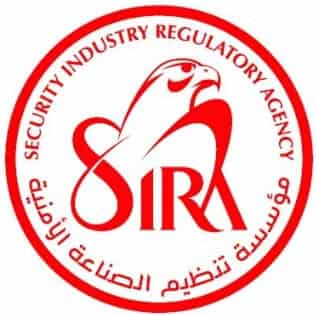SIRA Approved CCTV Company in Dubai

QuickData is a SIRA approved CCTV company in Dubai. We have several years of experience in installing CCTV systems at a variety of sites. These include hotels, shopping malls, restaurants, offices, shops, schools, warehouses, factories, and residential & commercial buildings.
We have SIRA’s approval for the following activities:
- Security Control and Alarm Equipment Trading
- Security and Surveillance Systems Installation and Maintenance
Being a SIRA approved CCTV installation company, we fully understand the CCTV requirements for different types of businesses. Our knowledge and our CCTV installation experience help us in giving the right solution to our customers. As a result, the SIRA audit inspection for our customers gets approved quicker than for most other companies.
We have an excellent reputation in the market, due to our superb technical support. Our customers consider us as of the best CCTV companies in Dubai.

What is SIRA Dubai?

SIRA Dubai is a government body responsible for managing the security industry in Dubai. SIRA is short for Security Industry Regulatory Agency. Dubai government created SIRA in 2016 to work as an independent agency. Before SIRA, the Department of Protective Systems (DPS) of Dubai Police managed this responsibility.
SIRA controls the licensing of all security activities in Dubai. These activities include guarding services, security system sales, installation, and consulting. Without SIRA’s approval, no company can have these activities on its trade license. SIRA approves both new permits, as well as license renewals of the firms.
SIRA has made it mandatory for companies engaged in certain types of business activities to install a CCTV surveillance system. Such businesses can obtain or renew their trade license only after a SIRA auditor has approved their surveillance system.
What are the CCTV installation guidelines of SIRA?
SIRA requires that all hotels, malls, banks, money exchanges, jewelers, SIM card traders, cinemas, theatres, sports complexes, and multi-tenant buildings. Some of these businesses are also required to install an intruder alarm system.
SIRA has published specific CCTV installation guidelines for the different types of businesses. These guidelines specify the installation locations of the cameras and the essential camera features. Other things defined are the Field of View (FoV) of cameras and the image sizes for different areas. The agency has also set the minimum acceptable resolution and frame rate of the video recording. SIRA has even specified the minimum period for which companies should maintain their CCTV video record at the site.
In 2018, SIRA issued a regulation that requires all critical businesses to connect their CCTV recorders to SIRA’s control room. For this purpose, SIRA provides a device called Video Guard. The Video Guard connects to the recorders locally and to the SIRA server over the internet. To know more about the SIRA installation guidelines, visit SIRA’s website.
How to get SIRA approval?

SIRA manages the approval process for CCTV systems through its online portal. All SIRA approved Security Service Providers (SSPs) have access to this portal. If you are a Security Service User (SSU), then you also need to create a Facility Account on this portal.
The approval process works as follows. First, the SSP uploads all the details of your CCTV system on the SIRA portal. These details include camera model numbers, IP addresses, and camera to recorder mapping. The SSP also uploads a schematic diagram and creates a maintenance agreement on the portal. Once the SSP has completed the installation and documentation, it requests for a SIRA audit.
On the receipt of the audit request, SIRA assigns an auditor to check your CCTV system. The auditor schedules time with the SSP and visits the site for an audit. If the auditor finds that your CCTV installation doesn’t meet SIRA’s requirements, he issues a FAIL report. In this report, the auditor lists the things that need to be rectified to get the inspection passed.
Based on the auditor’s comments, the SSP rectifies your CCTV system and re-applies for inspection. The auditor again comes for inspection, and if your CCTV installation meets all requirements, the auditor passes it. However, if the auditor fails it again, then this cycle continues. Once the auditor has uploaded the PASS report on the portal, the SSP applies for and obtains the NOC.
If you also have Video Guard installed at your site, then the approval process has an additional step. The SSP is required to obtain first the Video Guard connectivity certificate from SIRA. For this, the SSP uploads an SVG layout of your site on the Video Guard portal. The SSP also creates an E-map of the installed cameras and requests SIRA to verify the connectivity.
SIRA does a remote log-in to check the connection and to see if it can access all cameras. If successful, SIRA issues a connectivity certificate, which is an essential requirement for passing the SIRA inspection.
